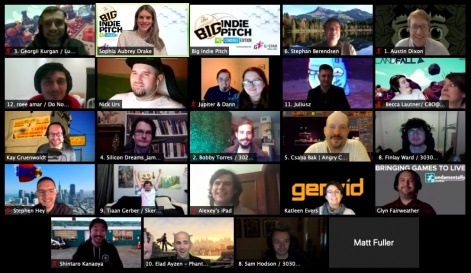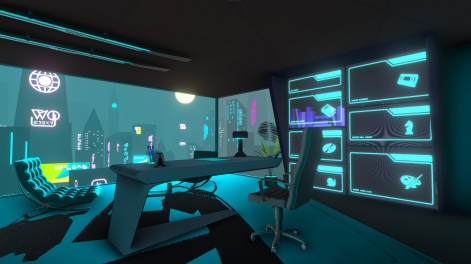The Big Indie Pitch is a regular event run by the makers of Pocket Gamer and PC Games Insider. It sees indie developers engage in a speed-dating-styled pitching competition for fame and those sweet, sweet promotional packages.
The event gives indies five minutes to pitch their games to a panel of press, publishers and industry pundits. The judges then pick three winners and everybody gets valuable feedback.
The indie view
The Big Indie Pitch is getting bigger and bigger as we bring it to events all across the world. To give you an idea of what the event is like, who attends the events and the games on show, we've sat down with a number of past PC Indie Pitch contestants to offer their views.
Today, we're speaking to Clockwork Bird's James Patton, who submitted Silicon Dreams to The Big Indie Pitch (PC+Console) at Pocket Gamer Connects Digital #4 and walked away with the prize for third place.

Sophia Aubrey Drake: Tell us a little about yourself and your indie studio - who is on the team, and what are their inspirations?
James Patton: Hi, I’m Jamie, one half of the team! I started out as a hobbyist game developer and got my big break when my first game, Spinnortality, had a successful Kickstarter and an even more successful launch on Steam. The income from that game was enough for me to become a full-time indie developer, and also to hire Danny, the second half of the studio.
I’m interested in games where narrative and mechanics interact in interesting ways. I love pretty much everything by Inkle (eg. 80 Days, Heaven’s Vault, Pendragon) and I’ve been a fan of Failbetter for years. Lately, I’ve found myself drawn to small, experimental games like Signs of the Sojourner, or works like Holonoptic, A Hand with Many Fingers or The Quiet Sleep.
I’m Danny, the other half of the team! I started my career in game dev as an analogue story game designer and, as Jamie said, I also got my big break when he launched Spinnortality.
I’m a big fan of games that allow players to set their own goals and find their own means of accomplishing them, like Factorio, or Kerbal Space Program. I’m inspired to combine these emergent experiences with narrative systems, setting the player free on a world and allowing them to explore and experiment, influence and be influenced by it while building their own unique story.
Tell us about Silicon Dreams, the game that you pitched during the competition.
It’s a cyberpunk interrogation sim where you have to root out deviant androids. The quick version is “It’s Blade Runner meets Papers Please”.
It’s set in a future where androids (humanoid robots) are common luxury devices like, say, Amazon’s Alexa. Except they can walk and talk and they say they have feelings. The player takes on the role of an interrogator android who has to question any androids that seem glitchy or troublesome and figure out if they should be sent to maintenance (which usually means a memory wipe), destroyed, or just let go. But what happens if the android is technically broken, but you actually quite like them, and don’t want to watch them die?
What do you think are the most unique and interesting aspects of Silicon Dreams, that gamers may never have seen before?
Two things. First, the emotional mechanics.
The characters (androids) you interrogate have their emotional state modelled, so they might be feeling super angry, or scared, or happy at any time. Each line of dialogue can alter that state. And there are some questions that an android won’t answer unless they’re in the right emotional state. So, for example, you might ask “Do you enjoy your work?” and they’ll reply “Sure, I guess” - but a popup will tell you that they’re actually holding back, and they might give a more truthful answer if they were more angry. So then you should ask about topics that make them angry, and then go back and ask the question again, and hopefully, they’ll answer “Ugh, fine! I hate my work!”
The other interesting mechanic is that you have to fill out a report for every scene… but you can lie. Your creators might ask, for example, “Can this android feel anger? (This is not supported in this model.)” Well, maybe you start asking them about their lives and discover that yes, they can feel anger. If you want to do your job well, you’ll dutifully note that down on the report, the company will reward you with a higher rank, and the android will most likely be killed. But if you want them to live, you can deliberately give the wrong answer. Will the company notice? Maybe - they do sometimes check on these things, though not always, so you might get away with it. But be warned: if they catch you in enough lies then your company rank will drop. I won’t spoil what happens if it gets too low, but I’ll just say: it’s very bad.
Silicon Dreams is a narrative based experience, one centred around the notion of what it means to be human. Whilst this isn't something you see every day, there are examples of this in the market, such as Detroit: Become Human. What made you want to tackle these topics, and what do you think you bring to narrative-focused games that may not have been seen before?
This game was born basically when I watched Blade Runner 2049 for the first time and then watched a fascinating, emotional video essay about it from Film Joy. It struck me that this movie was about an android and an AI hologram - devices, or people, without human rights - struggling to live a life that was meaningful to them in a world that was hostile at every turn. That really spoke to me; we decided the emotional pillar of the game should be “Who gets to be human?” Because there are a lot of people around today who are technically given human rights, but who are practically denied them: LGBTQ people in certain conservative areas of the US; trans people being denied healthcare in the UK; homeless people, refugees and people of colour throughout the western world and, more generally, working-class people of all stripes who may technically free but are shackled to jobs that suck the life out of them.
To that end, I think what we bring to the narrative space is detailed, compassionate writing that tries to humanise these characters and understand them, warts and all. No character in Silicon Dreams is perfect (you can make most of them cranky, after all!), and almost no character is irredeemable. We wanted to write a game that treated those topics with the humanity they deserved.
How did you come to choose the platforms that you would develop Silicon Dreams for?
I’ve always developed for desktop, and I use Unity, so Windows, Mac and Linux (which unity builds for) were pretty obvious choices. Some developers don’t make Linux or Mac builds because they’re a hassle, but I think the extra time I spend double-checking them is offset by Mac and Linux sales, even if they’re much smaller than Windows.
We’d like to do mobile or even a Switch port, but I haven’t done that before and know very little about the media landscape in that area, so it’d be a bit of an endeavour.
Looking at the studio a little more now. How hard is it to survive as an Indie developer?
It’s pretty difficult! Silicon Dreams had a rough launch week, and until it got reviewed in Kotaku its sales numbers were pretty bad. I think we made life difficult for ourselves by making a narrative game (a strategy or management title would have had an easier time selling), especially an experimental one, but I think it was worth it to convey our vision.
Thankfully some larger and more influential outlets have reviewed it so it’s now getting traction! But things looked really touch and go for the first two weeks.
We’re now trying to figure out how to survive long-term without relying on hail-Mary gambles like “We sure hope our experimental narrative game sells well”. It turns out that is a stupid sentence.

Are there any tips and advice you would give to an independent developer out there who’s just starting out?
Come up with a small, well-scoped project that you can finish without paying too many other people, and have a plan for how you’re going to keep the lights on during development and if it slips. As long as the project is actually well-scoped, and you won’t need to throw masses of money at it, you’ll be able to finish on time, and if it slips you’ve got that plan or buffer to fall back on.
If your project is too big for what you can afford or requires more people than you can put together and pay, or if it’s at risk of scope-creep (which Silicon Dreams was, I realised, when we redid the visuals for the 4th time!), scrap the idea and come up with a better one. You’re better off chucking different ideas around and eventually finding one that fits your means, rather than locking yourself into a risky or even doomed project.
Oh, and if you’re just starting out then you, by definition, have a lot to learn. I’d suggest making a number of smaller games rather than working on one big game: you learn more from doing lots of smaller projects than banging your head against one big one.
How did you find your experience pitching as a part of the Big Indie Pitch?
It was a lot of fun! The atmosphere in the digital green room was laid back and everyone seemed nice. It’s always a bit stressful pitching your darling idea, especially with fierce time constraints, but we’d prepared the pitch deck and practised a bit and it was pretty enjoyable.
What do you feel you have gained from the experience, and what do you still hope to gain?
Before I started engaging with pitch contests my slide decks were literally just plain white Powerpoint slides with Calibri text on them and a handful of arrows and screenshots. Being exposed to other people’s (much more visually interesting) pitches showed me where the bar is, and helped my pitch come across much better. I didn’t realise a business slideshow could convey atmosphere as well.
I hope that going forward, I’ll get better at putting these together so that pitching a game can become something kind of straightforward that I don’t have to agonise over. I’d love to be able to start work on the pitch deck and then be ready to pitch to publishers within 48 hours.
What are your hopes for this game in the future, and do you have any plans for any future projects?
Right now we’re doing basic patches and trying to add a few requested features, but we’re hoping to release a few more characters to interrogate. We did want to release entire DLC packs featuring different storylines that are happening elsewhere in the Silicon Dreams universe, but right now sales haven’t been strong enough to justify spending more time on that. Maybe in the future.
As for future projects, we don’t really have any lined up! We’re interested in doing some contract work to keep the studio running but don’t have much experience looking, so if anyone needs some narrative designers, writers or editors they should drop us a message.
Want to show off your exciting new game? We host Big Indie Pitch events throughout the year, so be sure to keep an eye out on our events page for an event near you, or even our new Digital pitches.
All our upcoming pitches including how to enter can be found over on our upcoming events page on BigIndiePitch.com.
Get the latest news, interviews and in-depth analysis on Twitter, Facebook, and our daily newsletter.












